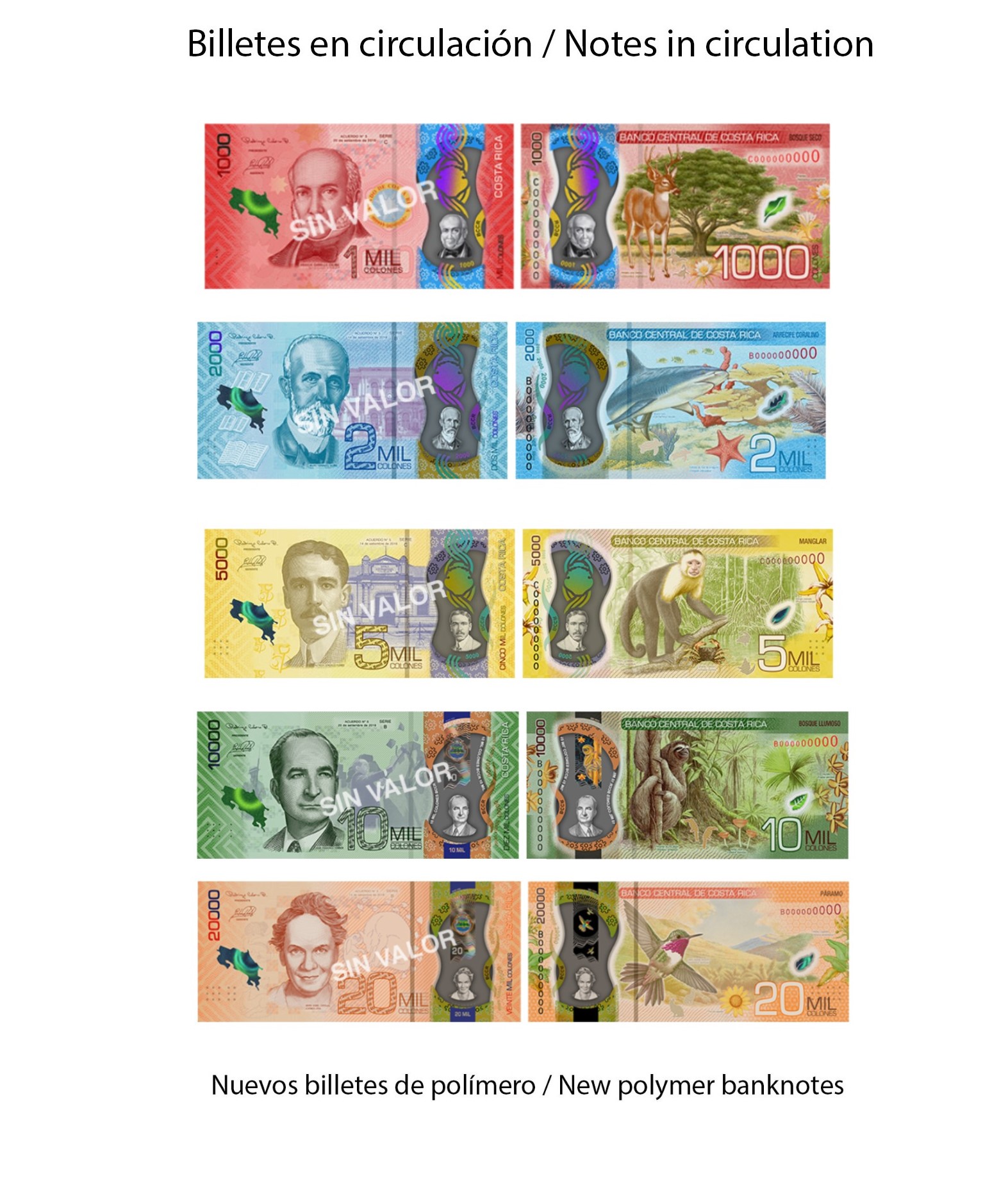Costa Rican Colon rate
WE SELL RATE HISTORY OF COSTA RICAN COLON
WE BUY RATE HISTORY OF COSTA RICAN COLON
COSTA RICAN COLON INFO
The Costa Rican Colon is the official currency of Costa Rica.
Notes: 1,000, 2,000, 5,000, 10,000, 20,000, 50,000 Colon
Coins: 1, 5, 10, 25, 50, 100, 500 Colon
Subunit: cent
Code: CRC
Symbol: ₡
Main Exchanges
About the Costa Rican Colón
The Costa Rican Colon is the official currency of Costa Rica. Its symbol is ₡ and its ISO 4217 code is CRC. The smallest unit at present is 1 Colon.
History of the currency of Costa Rica
The Colon was introduced in 1896 replacing the Costa Rican Peso. It was given the name of Colon in honor of Christopher Columbus (the surname is Colon in Spanish) to commemorate the 4th Centenary of the discovery of America. Each Colon was divided into 100 cents, but that subdivision was eliminated due to inflation.
Since 1950, the Central Bank of Costa Rica has been the bank in charge of issuing Costa Rican Colon banknotes and coins. Until then other banks, both private and central, had been responsible for this task.
Banknotes and coins of Costa Rican Colon
The Costa Rican Colon banknotes in circulation are 1,000, 2,000, 5,000, 10,000, 20,000. In the banknotes appear Beneméritos de la Patria (named as such to accredit their recognition for their contributions to the country) along with the six ecosystems present in Costa Rica. All colon banknotes are made of polymer.
BANKNOTES OF COSTA RICAN COLON IN CIRCULATION
Braulio Carrillo Colina, Head of State of Costa Rica in the first half of the 19th century, appears on the 1,000 Colon note. He is considered the "Architect of the Costa Rican State" and achieved the independence of Costa Rica from the Federal Republic of Central America. After him appears the Costa Rican State Coat of Arms. On the back appears the dry forest of Costa Rica with a Guanacaste tree, a pitahaya and a white-tailed deer.
On the 2,000 Colon note, Mauro Fernández Acuña appears, who held several important positions such as President of the Congress, Minister of Finance and Commerce or Director of the Bank of Costa Rica. He was also the precursor of profound reforms in the educational system of Costa Rica. After him appears the Superior School of Ladies. On the obverse is a coral reef with a bull shark, a starfish, marine feathers and the silhouettes of several sea turtles.
Alfredo González Flores, President of Costa Rica in the second decade of the 19th century, appears on the 5,000 Colon note. During his tenure the International Bank of Costa Rica was created, today the National Bank. Behind him appears the building of the International Bank. On the back there is a mangrove composed of several species, among which the red mangrove, a white-faced monkey and a marine crab stand out.
On the 10,000 Colon note José Figueres Ferrer appears, who was President of Costa Rica three times during the second half of the 20th century. Its main achievement was the abolition of the Costa Rican army. In the image behind him we see him knocking down one of the walls of an army barracks. On the obverse of the note appears a rain forest with a sloth and an orchid fungus cup.
Carmen Lyra, a writer considered the founder of Costa Rican realism, appears on the 20,000 Colon note. Behind her appears an illustration of one of his most famous works: Tales of my aunt Panchita. On the back of the note appears a wasteland with a sparrow hummingbird.
The Costa Rican Colon coins are 1, 5, 10, 25, 50, 100 and 500 Colon. In them appears the denomination and the shield of the country. All coins are gold and those of 5 and 10 Colon also have a silver version.
How many Costa Rican Colones should I take to Costa Rica?
If you are organising your trip to Costa Rica and do not know how many Costa Rican Colones you might need, we can help you. Our clients usually exchange around 360 Euros into Colones. If you want to make an approximate calculation of the money you need for your trip you must take into account if when you arrive you have to pay hotels, rental cars, excursions or tickets, or if you will only have the daily expenses such as food, public transportation or shopping.
Look for the closest office with this currency



